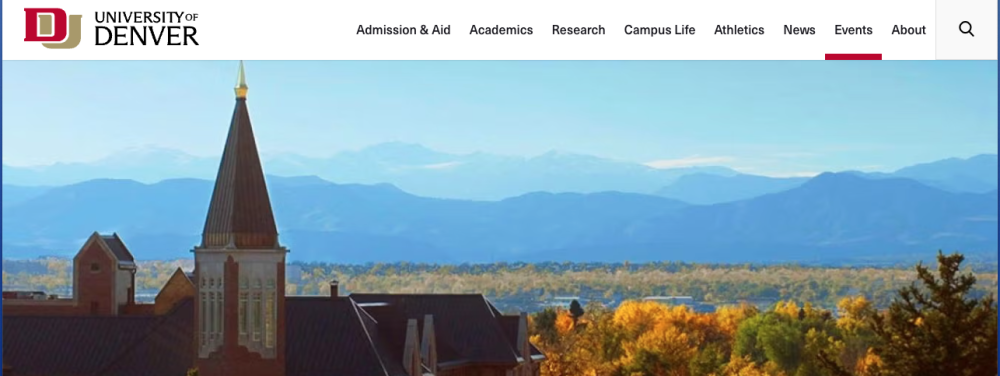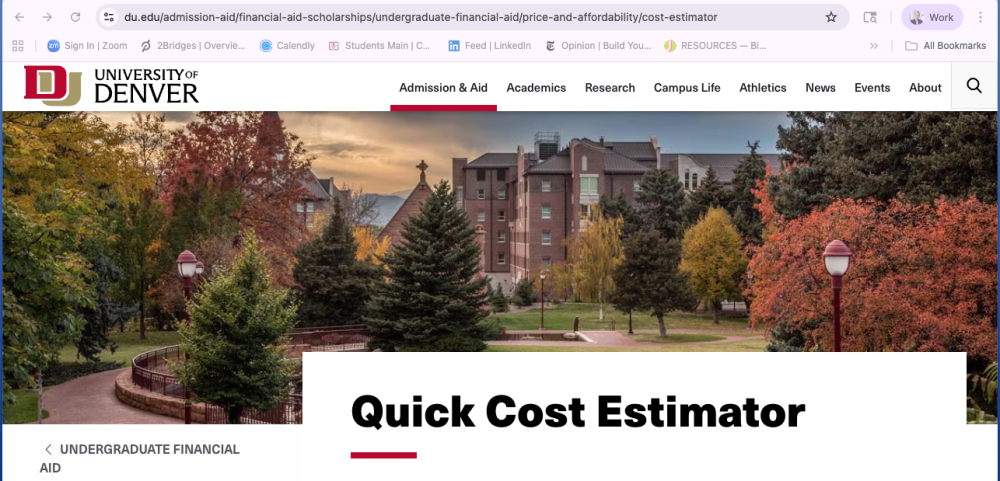Denver delivers student satisfaction
Fast facts for
University of Denver

What makes DU special
The University of Denver–known as DU–ranked #1 in Princeton Review 2024 for Students Who Love Their University. Princeton Review also gave the school #23 for Happiest Students and #24 for Most Beautiful Campus.
But it’s not just those rankings that make this a school worth heading to Colorado for. The school is based on “The 4D Experience,” with those four dimensions being Deepening Intellect, Developing Well-Being, Discovering Character, and Designing Careers and Lives of Purpose. Denver commits to a holistic education that goes far beyond academics.
The student body and campus life
Only 30% of students come from Colorado, and about 19% come from the Northeast and Southeast. You’ll find geographical and ethnic diversity at this R1 research institution. When you get here, you’ll have support from mentors in the form of academic advising for your major or for undecided students, for exploratory studies. The school boasts a top program for neurodiversity and disability support. They also provide peer mentors and resources for veterans and military personnel.
Denver is dedicated to the public good, and students have volunteered over a million hours giving back to the community. The University of Denver is Division 1 and have 18 active teams, and though they don’t have a football team, their men’s hockey team won the title in 2024, earning their 10th NCAA title.
Academic programs and admissions
Your application is read holistically for admission to DU as a whole, but you can go right into the college or school housing your major. There are no impacted or limited majors; however, the Lamont School of Music requires an in-person or virtual audition. Some institutions admit first to the university and then determine whether or not to admit you to your major. If you’re admitted to DU, you’re admitted to the major of your choice.
These are the undergraduate academic divisions:
- College of Arts, Humanities & Social Sciences
- College of Natural Sciences & Mathematics
- Daniels College of Business
- Josef Korbel School of Global and Public Affairs
- Ritchie School of Engineering & Computer Science
Financial aid reality check
For top Early Decision students, DU will meet full demonstrated need as shown through FAFSA and the CSS Profile.
To get a better sense of what you might expect to pay, use DU’s cost estimator: https://www.du.edu/admission-aid/financial-aid-scholarships/undergraduate-financial-aid/price-and-affordability/cost-estimator

Application strategy
DU has been test optional since 2019 and remains so today. If you submit your application without test scores, 90% of your holistic evaluation rests on your transcript and academic preparedness, and 10% rests on context and the “whole person.” Context and the whole person covers the counselor recommendation, the school profile, and your essay. If you choose to submit your test score, then 50% of the evaluation covers transcript and academic preparedness, 40% covers the test score, and 10% covers context and the whole person. I recommend carefully checking to be sure your test scores fall in the upper half of their published scores.
DU takes your transcript and strips it down to the unweighted GPA, then goes in and creates a weighted GPA by giving an extra .5 for honors and pre-AP classes and a full point for AP, IB, and dual-enrollment classes. They look at all courses, not just the core. They are particularly interested in seeing a positive trend, so if you got C’s in freshman and sophomore year but then show increasing rigor and had A’s and B’s junior and senior year, those C’s and even a D or two won’t necessarily condemn you to the deny pile. Demonstrated interest can work in your favor, so engage virtually if you can’t visit, and open those emails.
The DU academic experience
Denver uses a quarter system that builds in a six-week winter break. Fall semester ends before Thanksgiving and winter begins shortly after January 1. Spring begins in late March and ends the second week of June. The school year comprises 30 weeks altogether.
A medium-sized school of 6500 like DU can offer smaller classes. The average class size is 24 and 94% of classes have fewer than 50 students.
Experiential learning
Study abroad usually happens during fall of junior year, and 70% of students do some form of study abroad, whether that’s in the fall or during the six-week winter break. It’s one form of experiential learning that is baked into the curriculum. Another form of experiential learning happens through internships, and 78% of students have at least one. Finally, students have experienced more than a million hours of volunteering.
Notably, former secretary of state Condoleezza Rice attended DU, changing her major from music to international politics. She also received a Ph.D. in political science from DU.
According to Shanna Pomager, director of visit experience and file evaluation, “DU is an R1 research university and undergraduates have multiple opportunities to explore real-world research in STEM, business, social sciences, and the humanities.”
Why Denver matters
Of course the city of Denver, with its nearly 3 million people and close proximity to the mountains, will draw many to this institution, but DU offers so much more than location. The combination of academic excellence, student satisfaction, and real-world preparation makes this a compelling choice for students seeking a transformative college experience.